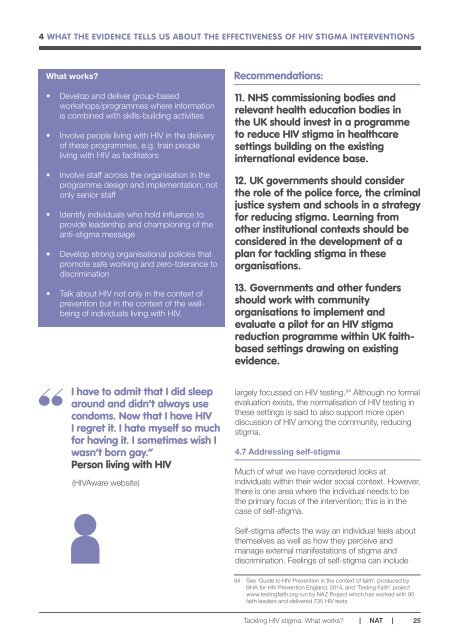Tackling HIV Stigma What works?
Jun_16_Tackling_HIV_Stigma
Jun_16_Tackling_HIV_Stigma
Create successful ePaper yourself
Turn your PDF publications into a flip-book with our unique Google optimized e-Paper software.
4 WHAT THE EVIDENCE TELLS US ABOUT THE EFFECTIVENESS OF <strong>HIV</strong> STIGMA INTERVENTIONS<br />
<strong>What</strong> <strong>works</strong>?<br />
• Develop and deliver group-based<br />
<strong>works</strong>hops/programmes where information<br />
is combined with skills-building activities<br />
• Involve people living with <strong>HIV</strong> in the delivery<br />
of these programmes, e.g. train people<br />
living with <strong>HIV</strong> as facilitators<br />
• Involve staff across the organisation in the<br />
programme design and implementation, not<br />
only senior staff<br />
• Identify individuals who hold influence to<br />
provide leadership and championing of the<br />
anti-stigma message<br />
• Develop strong organisational policies that<br />
promote safe working and zero-tolerance to<br />
discrimination<br />
• Talk about <strong>HIV</strong> not only in the context of<br />
prevention but in the context of the wellbeing<br />
of individuals living with <strong>HIV</strong>.<br />
Recommendations:<br />
11. NHS commissioning bodies and<br />
relevant health education bodies in<br />
the UK should invest in a programme<br />
to reduce <strong>HIV</strong> stigma in healthcare<br />
settings building on the existing<br />
international evidence base.<br />
12. UK governments should consider<br />
the role of the police force, the criminal<br />
justice system and schools in a strategy<br />
for reducing stigma. Learning from<br />
other institutional contexts should be<br />
considered in the development of a<br />
plan for tackling stigma in these<br />
organisations.<br />
13. Governments and other funders<br />
should work with community<br />
organisations to implement and<br />
evaluate a pilot for an <strong>HIV</strong> stigma<br />
reduction programme within UK faithbased<br />
settings drawing on existing<br />
evidence.<br />
I have to admit that I did sleep<br />
around and didn’t always use<br />
condoms. Now that I have <strong>HIV</strong><br />
I regret it. I hate myself so much<br />
for having it. I sometimes wish I<br />
wasn’t born gay.”<br />
Person living with <strong>HIV</strong><br />
(<strong>HIV</strong>Aware website)<br />
largely focussed on <strong>HIV</strong> testing. 94 Although no formal<br />
evaluation exists, the normalisation of <strong>HIV</strong> testing in<br />
these settings is said to also support more open<br />
discussion of <strong>HIV</strong> among the community, reducing<br />
stigma.<br />
4.7 Addressing self-stigma<br />
Much of what we have considered looks at<br />
individuals within their wider social context. However,<br />
there is one area where the individual needs to be<br />
the primary focus of the intervention; this is in the<br />
case of self-stigma.<br />
Self-stigma affects the way an individual feels about<br />
themselves as well as how they perceive and<br />
manage external manifestations of stigma and<br />
discrimination. Feelings of self-stigma can include<br />
94 See ‘Guide to <strong>HIV</strong> Prevention in the context of faith’, produced by<br />
BHA for <strong>HIV</strong> Prevention England, 2014, and ‘Testing Faith’ project<br />
www.testingfaith.org run by NAZ Project which has worked with 95<br />
faith leaders and delivered 735 <strong>HIV</strong> tests<br />
<strong>Tackling</strong> <strong>HIV</strong> stigma: <strong>What</strong> <strong>works</strong>? NAT 25


